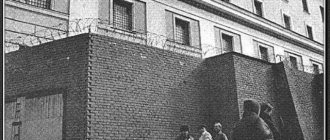Under criminal law, punishments for persons who have committed an unlawful act may vary. Some of the criminals are kept in strict conditions, but for those guilty of committing criminal activities that did not entail serious consequences, such punishment is unnecessary.
It is for these cases that there are colony settlements in Russia, where violators whose crimes did not entail serious consequences are serving their sentences. Behavior correction takes place in such government institutions, so all people who, for whatever reason, cannot take the legal path of correction in the conditions of their usual existence are sent there.
Download for viewing and printing:
Article 75.1. Sending convicts to a penal colony settlement of the Russian Federation
Special regime colony, what is it?
A special regime of imprisonment is a type of correctional institution in which prisoners sentenced to life imprisonment or those who have had their lethal injection commuted to imprisonment for twenty-five years (for life) serve their sentences.
A colony with a special regime has several conditions to ensure the existence of prisoners, they are as follows:
- are common;
- lightweight;
- strict.
They differ in the number of rights, room amenities, the ability to receive parcels, and the number of dates per year. The walls of one prison have several types of prisoners.
The prisoners are divided into cells, no more than two in number. If the prisoner wishes or if there are objective reasons (fear for life, health), the convict is sent to solitary living.
It is worth noting:
all persons imprisoned in special regime prisons serve the first ten years of their sentence under strict conditions.
There are certain rules, following which, the ZEK has the right to demand a transfer to the general order of serving a sentence. One of the rules is compliance with lawful behavior, the absence of such a punishment as being sent to a punishment cell.
A punishment cell is a small solitary cell. Furniture: bed, chair. Of friends - bare walls. It is a harsh type of punishment, complete isolation from society (cellmates).
The normal routine of life in the “zone” is not intended for persons who:
- committed an offense while serving a sentence imposed by the court;
- were sent to light or strict conditions.
What are special modes
Having registered with the Federal Tax Service as an LLC or individual entrepreneur, the taxpayer by default applies the general taxation system (OSNO).
This system has the highest tax burden and a large list of reporting. Small businesses with certain types of activities are allowed to apply special regimes that reduce the tax burden on small businesses and provide for less reporting. The possibility of establishing special regimes is provided for in clause 7 of Art. 12 of the Tax Code of the Russian Federation. It also defines the main approaches to the rules of their application:
- The transition to special tax regimes is based on the voluntary decision of the taxpayer.
- The fundamental points of each of them are regulated by the Tax Code of the Russian Federation.
- Each special regime may have its own taxes that are not provided for in the main list of federal taxes in force in the Russian Federation.
- In relation to each regime, the role of the subject of the Russian Federation in which the special regime is introduced is great. The subject can influence the conditions and limits of application of the regime, the specifics of determining the base and the amount of special tax rates, and establish an additional system of benefits. At the same time, those payments that are not associated with the special regime must continue to be paid according to the rules established by the Tax Code of the Russian Federation.
What is the difference between strict regime and special regime?
What is the difference between a strict regime and a special regime? A strict regime for serving a sentence is assigned to prisoners who have committed violations of order; persons convicted of a serious crime for the first time are also sent there.
The difference lies in what offenses the offenders are sent to prison for.
Another difference between the two prison regimes is that high-security offenders are sent to regular detention conditions. Prisoners sent to a special regime of imprisonment serve the full severity of their sentence for the first ten years.
The modes differ according to:
- articles for which those convicted are imprisoned;
- conditions of detention of criminals;
- the duration of their stay in strict conditions (nine months and ten years).
The rights of convicted persons are the same, the differences are in accordance with the assigned regime.
What modes are special?
There have been changes to the list of special tax regimes in 2022: Chapter 26.3 of the Tax Code of the Russian Federation, which regulated the procedure for applying UTII, has become invalid. This means that from 2022 the special regime in the form of a single tax on imputed income cannot be applied.
So the special regimes in the Russian Federation are:
- for agricultural producers (UES);
- simplified (USN);
- production sharing agreements (PSAs);
- patent (PSN).
Despite the fact that since the beginning of 2015, each of these systems has been affected by a number of innovations introduced into the Tax Code of the Russian Federation, their fundamental provisions remain the same. The main change in relation to special tax regimes was the introduction of the obligation to pay property tax on objects whose value is determined as cadastral.
The characteristics and conditions for using special modes are different. Therefore, when choosing, you should take into account a number of conditions: what types of activities the regime is intended for, what taxes it exempts from compared to the general taxation system, what restrictions are set for transition and application, how many times a year you need to submit reports, etc.. As an individual entrepreneur assess all these factors and choose the right special mode, ConsultantPlus experts explained in detail. If you don't already have access to the legal system, get a temporary demo access for free.
Who gets special treatment?
The most dangerous criminals are kept in special conditions.
Life imprisonment is given for crimes such as:
- aggravated murder;
- rape of a person under the age of 16 by a criminal who has already been convicted of a similar crime;
- terrorist attack;
- etc.
These conditions are assigned to criminals whose actions are directed against the interests of society and human life. Who is given a special regime - persons sentenced to life imprisonment.
Differences in taxation under special regimes
Special tax regimes differ significantly in terms of the tax bases to which the special tax rate applies. The base can be:
- A variable depending on the actual volume of income (or other object of taxation under a PSA) - for the Unified Agricultural Tax, the simplified tax system, the PSA. At the same time, for the simplified tax system there are 2 bases with different rates: “income minus expenses” with a basic rate of 15% and “income” with a basic rate of 6%.
- Constant (provided that the initial parameters on which its value is set remain unchanged) regardless of the volume of revenue - for PSN.
A set of indicators characterizing the main features of taxation under each of the special regimes is given in Table 2.
Read more about the most commonly used systems in this material.
Regime of special conditions in a correctional colony
Correctional institutions have a system of rights, responsibilities, and permissions. For prisoners, these rights are severely limited, however, while remaining human, they retained a minimum list of permissions.
Prisoners under general conditions of detention are allowed to:
- waste of funds received from the state. benefits earned or received by transfer to a personal account (no more than 7,200 rubles);
- make appointments, no more than three short and three long ones per year;
- receive three small and three large parcels per year.
Convicts in light conditions have the right to:
- waste of funds received from the state. benefits earned or received by transfer to a personal account (no more than 7,800 rubles);
- make appointments, no more than four short and four long ones per year;
- receive four small and four large parcels per year.
Persons in lighter conditions live in prison dormitories.
The list of goods permitted for purchase by prisoners is uniform. These include:
- things (items) of prime necessity;
- legal services;
- visiting a hairdresser;
- medical consultation (prescription of treatment).
Prisoners transferred to maximum security conditions have the right to:
- Spending money received from the state. benefits earned or received by transfer to a personal account (no more than 6,600 rubles).
- Make appointments, no more than two short and one long per year.
- Receive one small and one large parcel per year.
- Walk no more than an hour and a half every day. In the absence of offenses and disputes with superiors, the walk can be extended to three hours.
Walking is permitted for all persons in custody, with the exception of those under the sanction of a punishment cell.
The main differences between a prison and a colony
What is the difference between a prison and a colony? It differs in that it limits freedom of movement within the institution itself. All prisoners are housed in a special building or several buildings. These buildings have a common line of defense and a highly strict access regime.
The main difference between a prison and a colony is that the movement of people in prison is reduced to a minimum. Often it consists of a short walk. The only entertainment in prison is meeting with a lawyer.
Movement without security escort is prohibited. The territory is under constant surveillance. Repeat offenders and people who have committed crimes of particular gravity are sent to prison. Children and seriously ill people are sent to a colony.
What is the difference between a prison and a colony? The colony has several buildings with different purposes. This is a kind of settlement for convicts. There may be barracks, work areas, a boiler room, an administration building, and even a store. The life of a prisoner in a colony resembles his former life in freedom.
The goal of the colony is to correct a person who has stumbled, to return him to the fold of society. This is its main distinguishing criterion. Repeat offenders are sent to prison, for whom no one hopes to reform.
Colony-settlement: who lives, for how long, conditions of detention
This type of correctional institution, which is part of the system of institutions of the Federal Penitentiary Service, is usually located in a wooded area and does not have any special fencing. Neglect to establish a protected perimeter of such a territory is compensated by the remoteness of this type of institution from populated areas. For reference! Correctional institutions are primarily engaged in felling and logging, as well as other socially useful work.
Types of institutions
Within the framework of criminal legislation, two types of colony-settlements are distinguished, which are intended for different types of criminals:
- Guilty persons who have committed an unlawful act due to certain circumstances, through negligence, with intent, but the consequences caused are not higher than average severity.
- Persons who were sentenced to serve a sentence in the form of stay in a strict or general regime colony, but by their exemplary behavior deserved a mitigation of the punishment applied to them.
Of course, the very organizational form of such institutions does not depend on the contingent of people contained in them, therefore this division is rather conditional in nature and in practice is used only to distinguish individuals with deep behavioral defects from less malicious criminals.
Who are colony settlements intended for?
Within the framework of criminal legislation, colony settlements can be assigned to those persons who have committed crimes that meet the following conditions:
- An unintentional unlawful act, if the crime was committed due to a combination of circumstances or in protecting the interests of the guilty person.
- The crime was committed intentionally, but during its execution, only damage not exceeding the average severity occurred.
In this case, the punishment to such persons should be nominal. It is believed that such persons can be returned to society as full-fledged citizens, but only after minor correction of their behavior. During these corrective measures, the person is explained that any issue can be resolved without resorting to committing crimes.
Features of a maximum security colony
What is the difference between a prison and a maximum security colony? Only men are sent to this colony. Their crime must be especially serious and committed for the first time. Sometimes people are sent to such a colony in whose actions a dangerous relapse of crime was seen. Persons who have violated order in a colony-settlement are also sent to this colony, if such is the court order.
Living conditions in this place are very harsh; prisoners are not allowed to move around without handcuffs. They live in designated buildings - dormitories. Residents of the colony are allowed to use personal funds from their account, the amount is limited.
There can be 2-4 short-term dates and 2 long-term dates per year. You are allowed to receive 6 parcels and parcels per year. If the rules of order are violated, the convicted person may end up in special locked cells. Movement within the area is very limited.
Peculiarities of execution of punishment in colony settlements
It is worth remembering that the purpose of a colony-settlement as a measure for a person to serve imprisonment is rather nominal in nature. Many compare such a stay in such an institution with a long shift. The application of restrictions on the rights and freedoms of a prisoner is rather a test of the guilty person’s ability to function normally. Important! In view of this, some prisoners who were transferred to a colony from places with strict security do not consider such institutions a place of isolation, due to the lack of a strict perimeter and security.
What is the difference between a prison and a general regime colony?
The general regime is intended for the following categories of people: - persons who have committed a serious illegal act intentionally, but for the first time; - adults who are ordered to spend their imprisonment in a general regime colony; - minors convicted of committing especially serious crimes and who had reached the age of majority by the time the verdict was announced; - women who have committed illegal actions (this includes relapse) in a particularly serious form; - persons who commit minor criminal acts not for the first time; - persons who have reached the age of twenty-one and have been transferred from an educational colony.
Persons held in a general regime colony live in dormitories. They can use a certain amount of money from their personal account. 2 to 6 dates per year are allowed. During such meetings, the telephone is used. Visits can be long or short, depending on the court order and the behavior of the prisoner. Receiving parcels is allowed.
Types of institutions
Conditions for keeping
According to the law, persons who live on the territory of such correctional institutions do not receive any punishment as such.
As practice shows, deprivation of liberty in such colonies is rather nominal in nature, due to the lack of fences and security. The whole restriction for criminals boils down to the fact that convicted persons are constantly monitored to see whether he can socialize in society after serving his sentence, and whether he will not go beyond the limits regulated by law.
Specific modes of residence
A colony-settlement, as well as any other correctional institution, has certain frameworks that every convict must follow. Of course, unlike other colonies, there are no strict regimes here, but there are rules of conduct, for violation of which the offender can be transferred to general regime institutions with more severe conditions of detention.
- Possibility of living in a hostel. For example, if a convicted person has a family, they can live together in the colony.
- A person’s behavior should not contradict the rules of conduct established in the colony.
- Residents of the colony can move freely throughout the territory of the colony. If desired, a person can even move to the nearest populated area, but only after receiving consent from management.
- On the territory of a correctional institution, persons may wear civilian clothes that do not have any tags indicating that the person is considered a prisoner.
- Consumption of alcohol and drugs on the territory of a correctional institution is prohibited.
- Every person living on the territory of the colony must work, regardless of whether he has a means of subsistence. In his free time from work, the offender can study (if there are branches of educational institutions nearby).
- While a person is on the territory of a colony-settlement, his passport is taken away and another document confirming his identity is issued in its place.
- At any time the guilty person is on the territory of the correctional institution, a search may be carried out in his home at any time. If dangerous objects or illegal substances are found, the violator is held accountable.
Transferring from a general or strict regime colony
Criminal law provides for the possibility of transferring a person held in a maximum security or general regime colony to a correctional institution.
But at the same time, in the colony where the criminal was sent, he must serve at least 25 percent of the established term. Referral to a colony-settlement is possible only if all of the following conditions are met:
- There are no complaints.
- There are positive recommendations and reviews.
- The prisoner is conscientious about his work and education.
- A person takes part in social life.
- There are no conflict situations with other prisoners.
- The prisoner has a desire to change the conditions of his detention.
Features of a maximum security colony
What is the difference between a prison and a maximum security colony? Five dates during the year, you are allowed to use money from your personal account to purchase basic necessities. In total, the prisoner will receive 2 parcels and 2 parcels per year. For good behavior you are allowed to receive an additional 3 parcels and 1 parcel.
Subject to compliance with all the rules and regulations of the institution, the prisoner has the right to count on additional opportunities: - an increase in the amount that can be spent on food or hygiene products; — receive more parcels and parcels.
General features of special tax regimes
Existing types of special tax regimes, with a large number of fundamental differences among themselves, also have a number of common features. At the same time, they are divided into the following groups in relation to:
- Regarding the scale of activities of persons applying these regimes: Unified Agricultural Tax, Simplified Taxation System, PSN are intended for small enterprises, and PSA can only be used by full-fledged taxpayers.
- To the circle of taxpayers. Unified agricultural tax and simplified tax system are available to both organizations and individual entrepreneurs. PSA can only be used by organizations, and PSN can only be used by individual entrepreneurs.
ATTENTION! Officials plan to allow small businesses included in the SME register to use PSN. In addition, the bill considers the possibility of increasing the amount of income and the number of employees. For details, see this material.
ConsultantPlus experts spoke in more detail about the conditions for using PSN. If you do not have access to the K+ system, get a trial online access for free.
- Object of application. Unified agricultural tax, PSA and PSN are possible only for certain types of activities, and simplified taxation for the majority (with some exceptions).
- A set of taxes, instead of which a special tax is charged. With the Unified Agricultural Tax, the simplified tax system and the PSN, it replaces the income tax (for individual entrepreneurs - personal income tax), property (except for the tax calculated from the cadastral value) and VAT. For PSA there is no special tax as such, but a system of benefits for most existing taxes is applied, allowing for the complete abolition of some of them.
- Compatibility with each other and OSNO. The PSA is not compatible with any of the modes. OSNO, Unified Agricultural Tax and simplified taxation system cannot be combined with each other, but can be used together with PSN.
Read more about the possibility of combining modes in the article “What are the features of combining OSNO and simplified taxation system?”.










